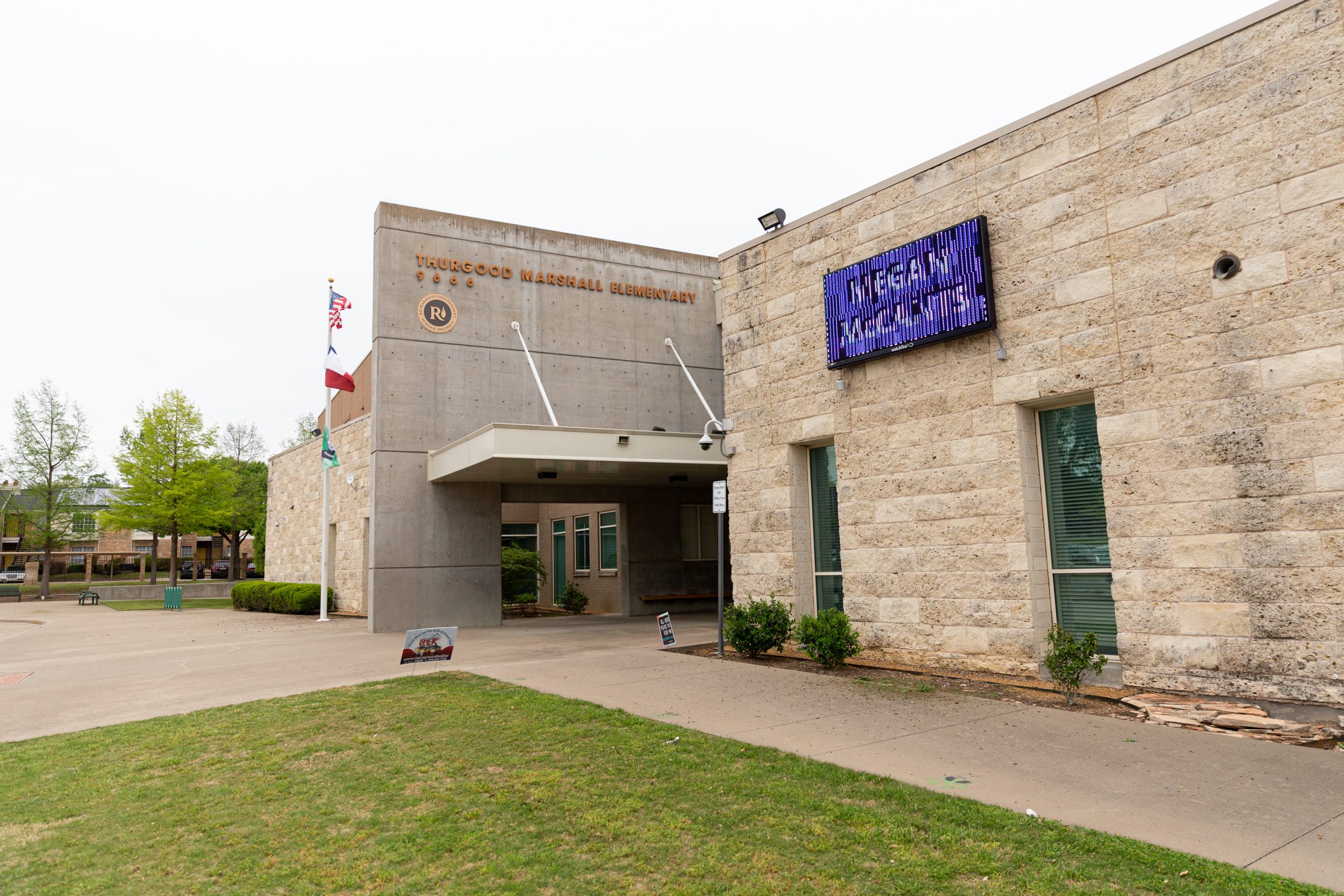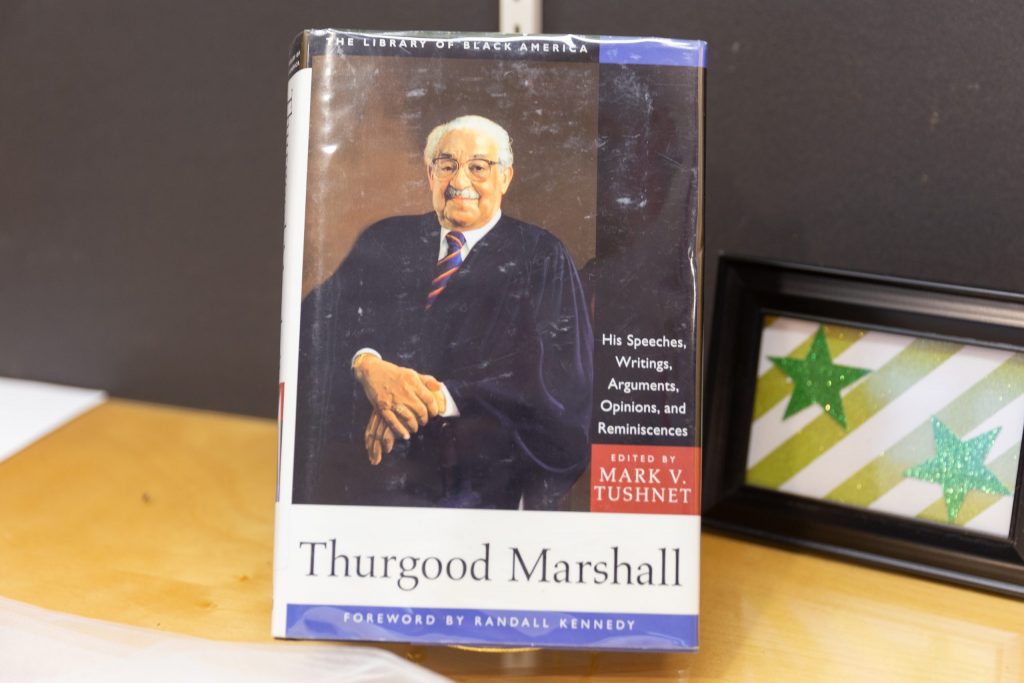Photography by Jessica Turner
The history behind how Richardson ISD’s Thurgood Marshall Elementary got its name is just as important today as it was 16 years ago.
“I think people kind of walk away from things after they’ve been in place for a number of years. But the fact is that (Thurgood Marshall) represents the quintessential as it relates to justice,” says former RISD trustee David Tyson.
Tyson, who was an RISD trustee for two terms, played a key role in the school’s naming before its 2005 opening.
RISD traditionally names schools after the area they reside in, so TME was to be named Ferris Creek Elementary. At a board meeting prior to the opening, a trustee mentioned the school would likely be the last built in the district, and RISD still had not named a school in honor of an African American.
The board president at the time initiated an ad-hoc committee to decide on a name.
Tyson was the first Black board member in RISD. He started his first term as trustee in 2004.
The ad-hoc group considered a few local Black leaders for the school’s name, but Thurgood Marshall was suggested that year to commemorate the 50th anniversary of Brown v. Board of Education.
Marshall was a lawyer and civil rights activist who served as associate justice of the Supreme Court of the United States from 1967 to 1991.
“Whenever you’re the first of anything, there’s always some type of hesitancy, in terms of how people will receive you and how people will perceive you,” he says. “What was also going through my head was: ‘How will people perceive and receive Thurgood Marshall?’”
The group also kept the school’s community in mind when choosing a name.
“This school, in terms of where it’s located, (serves) a large African American population,” Tyson says.
The name was presented to and approved by the board. The consensus was that Marshall’s fight for equal rights and justice in education should be honored in the district.
“This was a good way to recognize what had happened 50 years ago,” Tyson says. “And it also recognized what was happening then in RISD with the district having its first person of color elected to the board.”
“We’re Thurgood Marshall strong” is the first thing that comes to TME principal Charmaine Curtis’ mind when she thinks about the school. Marshall’s impact on education for African American students motivates her to hold the school to a high standard.
“I want to make sure our school is reflective of that same high regard and that students understand the privilege that they have to attend a school called Thurgood Marshall,” she says.
Curtis and the rest of TME’s staff work together to live up to Marshall’s impact through elevated school operations, academic achievement, character building and overcoming challenges.
“The goal is to build up that strength in students that we see in Thurgood Marshall,” she says.
The name holds a special place in Tyson’s heart, as he met Judge Marshall when he was 14 years old in his hometown of Shreveport during a convention.
“The guy didn’t just say ‘Hello, how you doing?’” he says. “He said ‘Tell me about who you are. What are your grades like? What are you going to do when you grow up?’”
Tyson’s connection to Judge Marshall continued into adulthood after becoming a member of the same fraternity, Alpha Phi Alpha, which is the first intercollegiate historically African American Greek-lettered fraternity. Alpha Phi Alpha also includes membership from civil rights icons like Martin Luther King Jr. and Andrew Young.
It has been more than 11 years since Tyson was a trustee, but he still strives to help today’s TME students and staff understand the significance of the school’s name.
“It means a whole lot to me today because of the things that have happened in our country over the last four years,” he says.
Principal Curtis educates new and current TME students on Marshall’s impact at the beginning-of-the-year assembly. Teachers also craft lessons catered to each grade level on Marshall, but Curtis says she wants this to occur more regularly during the school year.
“I want to make this much more purposeful moving forward,” she says. “In the sense that we have a team that collaborates in creating a weeklong unit or a unit that we touch in the first and second semesters.”
During Black History Month, TME conducted daily activities for most of the month. The district noticed this and created a video series on TME’s efforts for the district newsletter, says Angie Lee, director of RISD’s equity, diversity and inclusion department.
“They were really wanting to make sure that every student was able to understand the Black joy and Black expression and the richness of Black history that so many people have contributed to,” Lee says.
As TME works to educate students and staff on Marshall’s legacy, Curtis says this must be achieved at the district level as well.
“There are a lot of misconceptions and negative perceptions related to Thurgood Marshall the school. I think people know it, but we have a long way to go to truly, truly hold this school with the same regard as some of the others,” she says.
Tyson returned to TME during Black History Month to help revive two key mementos from the school’s opening.
One is a Thurgood Marshall biography that RISD trustees at the time brought from the Supreme Court library in Washington, D.C. Each trustee signed the inside of the book. The signed copy is kept at the school’s entrance.
The second memento is a letter written to TME by Andrew Young, a civil rights leader and former US ambassador to the United Nations. Tyson got Young to write the letter in 2004 after they both attended the Thurgood Marshall postal stamp dedication in Dallas. Young’s letter was recited at TME’s opening day ceremony, but the physical copy is unable to be located. The school’s staff is working to retrieve the letter.
Continuing to re-engage TME on Marshall’s legacy will remain a priority for Tyson. “I think it’s important that we not forget the legacies of people who are Americans first and what they’ve brought to this country that makes us a United States of America,” he says. “Justice Thurgood Marshall did that for all of us.”







